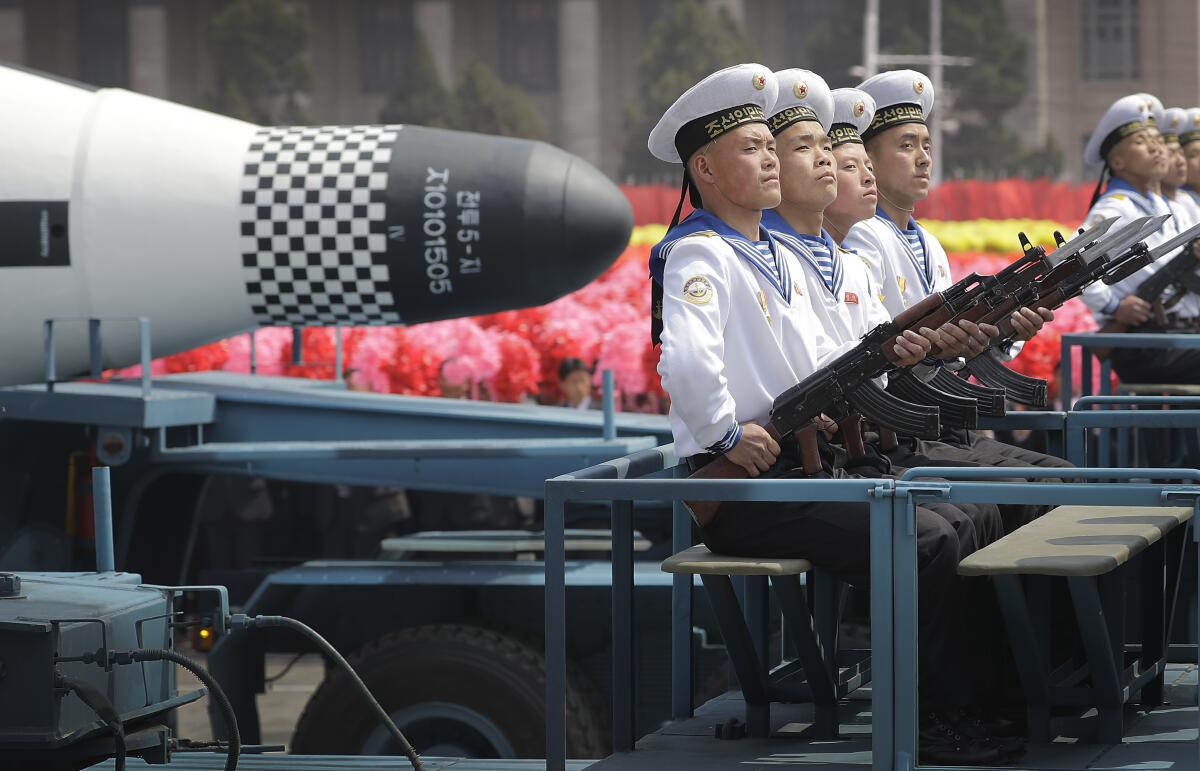U.S. to sanction North Korea over recent long-range missile tests

- Share via
WASHINGTON — The White House plans to impose new sanctions on North Korea on Friday over two recent missile tests that the administration has concluded were clandestine attempts to evaluate Pyongyang’s ICBM capabilities.
The two missile tests “involved a relatively new intercontinental ballistic missile system,” according to a senior administration official who briefed reporters on the sanctions.
The launches, which took place on Feb. 26 and March 4, are believed to be a prelude to North Korea’s testing of an ICBM or a nuclear bomb in the coming months, as the two missiles themselves “did not demonstrate ICBM range or distance.” North Korea in 2017 tested ICBMs that analysts assessed had the capability of theoretically reaching the U.S. mainland.
“This is a serious escalation by the DPRK,” the official added, noting that, “unlike its past tests, DPRK tried to hide these escalatory steps.” DPRK is an acronym for Democratic People’s Republic of Korea, which is North Korea’s formal name.
The sanctions, which are expected to be imposed on Friday by the Treasury Department, aim to limit North Korea’s access to foreign items and technology likely to be utilized in its push to develop and expand its nuclear arsenal.
“These actions are intended to make clear to the DPRK that these unlawful and destabilizing activities have consequences, that the international community will not accept these actions as normal, and most importantly, that the only viable path forward for the DPRK is through diplomatic negotiations,” the official said, speaking on condition of anonymity before the sanctions are made public.
Even before the latest tests, Washington had taken note of North Korean leader Kim Jong Un’s renewed determination to bolster his country’s nuclear weapon delivery capacity with ICBMs, intermediate-range ballistic missiles and submarine-launched missiles.
A Feb. 7 report from the U.S. Directorate of National Intelligence noted that “in January, North Korea began laying the groundwork for an increase in tensions that could include ICBM or possibly a nuclear test this year — actions that Pyongyang has not taken since 2017.”
North Korea conducted seven missile tests in January, more than it had in all of 2021. It halted weapons tests for most of February, probably out of deference to China, which was hosting the Olympics. The resumption of tests came on the eve of presidential elections in South Korea.
Kim’s pursuit of greater nuclear capabilities presents another foreign policy challenge for President Biden as he is focused on Russia’s unprovoked war in Ukraine and imposing sanctions on the Kremlin in hopes of convincing President Vladimir Putin to de-escalate.
War breaking out in Eastern Europe — the heaviest fighting on the continent since World War II — has also shown the limits of even the most assiduous and coordinated efforts at diplomacy, especially when it comes to deterring an autocrat with a nuclear arsenal. Biden and European leaders spoke with Putin several times, threatening sanctions and further geopolitical isolation, but were not able to forestall an attack.
Although he has not engaged with Putin since the invasion began, Biden has left the door open for talks if Russia is ready to ease its bombardment of Ukraine’s cities.
The administration signaled it is open to talks with Kim, but not the kind of summit pageantry favored by President Trump, who held two summits with North Korea’s leader but made little substantive progress toward disarmament.
“President Biden himself has previously made clear that he is open to meeting with Kim Jong Un when there is a serious agreement on the table, which would need to be based on working-level negotiations,” the official said. “Because as we saw in the past administration, leader-level summits alone are no guarantee of progress.”
More to Read
Get the L.A. Times Politics newsletter
Deeply reported insights into legislation, politics and policy from Sacramento, Washington and beyond. In your inbox three times per week.
You may occasionally receive promotional content from the Los Angeles Times.











